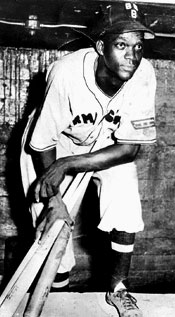

Lorenzo Davis
Nickname: Piper
Career: 1942-1950
Positions: 2b, 1b, ss, manager
Teams: Birmingham Black Barons (1942-1950), minor leagues (1950-1958)
Bats: Right
Throws: Right
Height: 6' 3'' Weight: 186
Born: July 3, 1917, Piper, Alabama
Died: May 22, 1997
A star infielder for the Birmingham Black Barons from 1942 to 1949, Piper formed a great keystone combination with Artie Wilson. Equally adept at playing first base or second base, the tall, smooth infielder was a master of the double play and was considered a premier player in the league. He had outstanding hands, an accurate arm, and, while not a speedster, was proficient at executing the hit-and-run play. A good ground-ball man, he was also at home at shortstop and could play any position and often exercised this versatility during his professional baseball apprenticeship.
He turned pro with the Omaha Tigers in 1936. He played in Alabama's Coal and Iron League in 1937, was with the Yakima Indians in 1938, and was with Acipco in the Industrial League in 1939-1942. It was not until 1942 that he entered the black big leagues, when he joined the Black Barons for the latter part of the season. After his arrival, the team won consecutive Negro American League pennants during Piper's first two full seasons with the team. In 1943, his official rookie season, the right-handed swinger hit .386 with good extra-base power. After the "sophomore jinx" resulted in an uncharacteristic poor showing (.142 batting average), he rebounded in 1945 with a .313 average.
Noted as a good curveball hitter, during the next four campaigns (1946-1949) he recorded marks of .273, .272, .353, and .378 and was selected to the East-West All Star team each year, where he batted in the heart of the lineup and compiled a .385 average for his All Star appearances. In 1948, as playing manager of the Black Barons, he led his team to the pennant and a World Series showdown with the Homestead Grays. As manager, Piper had a commanding presence and an abundance of patience. One of his prize pupils that season was a teenager named Willie Mays, who later became one of the greatest centerfielders ever to play the game.
The versatile fielder continued in his capacity as player-manager until he became the first black player signed by the Boston Red Sox organization, in 1950, and batted .378 in the interim. Davis had been acquired by the St. Louis Browns in July 1947 at the same time that Willard Brown and Hank Thompson were signed, and was to report in thirty days with an option to buy. He was hitting .359 at the time, but the Browns wanted to option him to Elmira, but he wanted to play with the Browns and consequently the option was not exercised. This release of the option rights may have been misinterpreted by other teams who subsequently scouted Davis. When the Red Sox signed him two years later, he was also being scouted by the Yankees, whose scouting report called him a good ballplayer but stated that "if he wasn't good enough for the Browns two years ago, he couldn't make it with the Yankees now."
Unfortunately, when he signed with the Red Sox, their rookie first sacker Walt Dropo had a super season, and Davis was assigned to Scranton in the Eastern League, where he hit .333. Subsequently he played with Ottawa in the International League (.263) and in the Pacific Coast League with the Oakland Oaks and Los Angeles Stars, with a batting average oscillating around .300. After seasons of .306. .296, .288, and .316 on the Coast, Piper played his last two baseball seasons in the Texas League. His last season, 1958, he hit .282 to wind down his baseball career. Before he retired, Piper's versatility was showcased with a special night when he played all nine positions, as he had also done in the Pacific Coast League.
Playing the year around during his prime. Piper also spent eight winter seasons in Latin America, with stays in Venezuela (1953-1956): Puerto Rico (1949-1950, 1950-1952); and Mexico and the Dominican Republic (1956-1957).
Piper received his nickname from his hometown, Piper, Alabama, where he lived while working in the coal mines. A natural athlete. he excelled at both baseball and basketball and. after being rescued from the mines because of his athletic ability, was signed by the Harlem Globetrotters. While also serving as the Globetrotters' road manager, he played both sports for two years (1943-1944) before choosing baseball as a career.
That choice proved a good one, and seventeen years later, after the 1958 season as a player-coach with Fort Worth in the Texas League, at age forty-two, Piper hung up the spikes a final time. After his active diamond days were ended, he remained active in baseball, scouting for the Tigers, Cardinals, and Expos for a total of eleven years (1968-1976, 1984-1985).
Source: James A. Riley, The Biographical Encyclopedia of the Negro Baseball Leagues, New York: Carroll & Graf Publishers, Inc., 1994.

Lorenzo "Piper" Davis